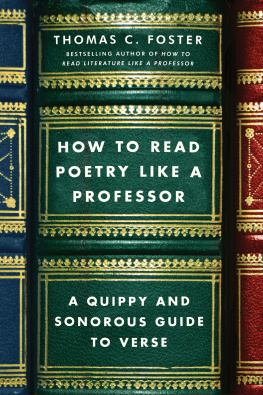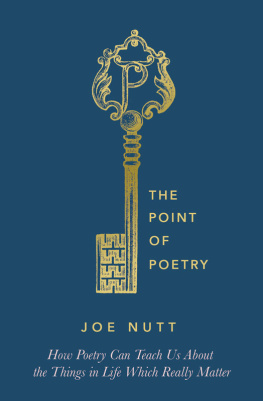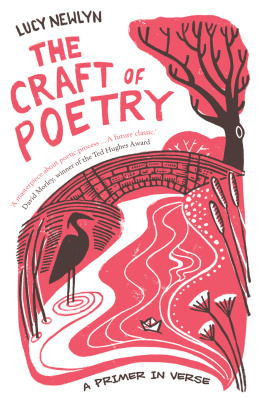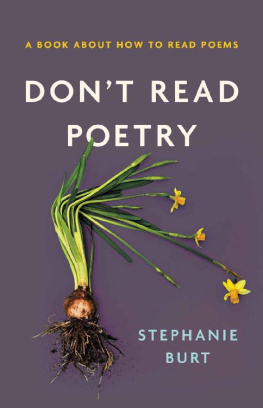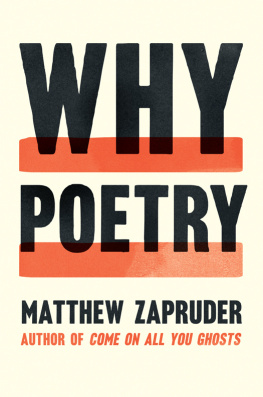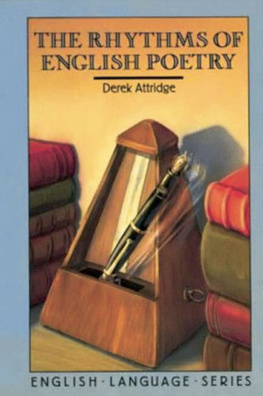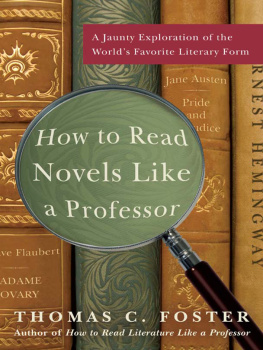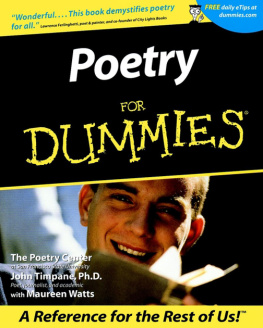Contents
Guide
Contents
Australia
HarperCollins Publishers Australia Pty. Ltd.
Level 13, 201 Elizabeth Street
Sydney, NSW 2000, Australia
www.harpercollins.com.au
Canada
HarperCollins Canada
2 Bloor Street East - 20th Floor
Toronto, ON M4W 1A8, Canada
www.harpercollins.ca
India
HarperCollins India
A 75, Sector 57
Noida
Uttar Pradesh 201 301
www.harpercollins.co.in
New Zealand
HarperCollins Publishers New Zealand
Unit D1, 63 Apollo Drive
Rosedale 0632
Auckland, New Zealand
www.harpercollins.co.nz
United Kingdom
HarperCollins Publishers Ltd.
1 London Bridge Street
London SE1 9GF, UK
www.harpercollins.co.uk
United States
HarperCollins Publishers Inc.
195 Broadway
New York, NY 10007
www.harpercollins.com
How to Read Literature Like a Professor
How to Read Novels Like a Professor
Twenty-Five Books That Shaped America
Reading the Silver Screen
HOW TO READ POETRY LIKE A PROFESSOR . Copyright 2018 by Thomas C. Foster. All rights reserved under International and Pan-American Copyright Conventions. By payment of the required fees, you have been granted the nonexclusive, nontransferable right to access and read the text of this e-book on-screen. No part of this text may be reproduced, transmitted, downloaded, decompiled, reverse-engineered, or stored in or introduced into any information storage and retrieval system, in any form or by any means, whether electronic or mechanical, now known or hereafter invented, without the express written permission of HarperCollins e-books.
FIRST EDITION
Cover design by Sarah Brody
Cover photograph Helen Sessions / Alamy Stock Photo
Digital Edition MARCH 2018 ISBN: 978-0-06-268406-6
Version 02222018
Print ISBN: 978-0-06-211378-8
For Leonora H. Smith, F. Richard Thomas, and Danny Rendleman
Superb poets, better friends
E VERYBODY TALKS ABOUT POETRY, BUT NOBODY DOES ANYTHING about it. Or maybe thats the weather. Actually, one of the problems with poetry is that people dont talk about it. Or not enough. In part, we dont know what to say. Maybe its just intimidation. I cant tell you the number of students over the years who told me that they like to write poems, but they dont read them. Seems a little one-sided, doesnt it? And if you dont read them, how do you even know the stuff youre writing is poetry? This suggests an impulse toward poetry is strong in a lot of us, including some who dont much like it. But we already knew that; the modern American poet Marianne Moore said of poetry, I, too, dislike it. In a poem, no less. Called Poetry. Of course it was.
I think that for most people, however, the matter isnt so much not liking poetry as feeling somehow overmatched, as if it were a contest and the other side had better equipment and more skill. Or as more than one student has said to me over the years, I like poetry, but I dont understand it. Not an enviable position in which to find oneself. I actually think a more accurate second half of that statement would be something closer to I dont understand it enough. The truth is that at least in my experience readers mostly understand the poems they read. They will get the gist of the poem, especially if the poem is written in their own idiom. If youre reading Shakespeares Elizabethan English or Geoffrey Chaucers Middle English, there are nearly insurmountable barriers to understanding for a lot of folks before we ever get to the poetry part. But almost anyone can read a lot of contemporary poetry, can take plenty away from Adrienne Rich or Billy Collins or any of a hundred recent poets who intend to be understood. And there are lots and lots of them. Honest.
What we need, then, isnt basic literacy skills (although possessing those is an excellent beginning) but the specialized set of tools for dealing with poetry. After all, who wants to spend the time reading something only to mostly understand it? Lets begin to fill that toolbox.
T HE LEARNING-TO-READ-POETRY STORYOR, FOR ME, THE LEARNING -to-teach-how-to-read-poetry storycame when I would teach our course in the classics in translation, or what we called, immodestly, The Literature of Greece and Rome. The syllabus wound up considerably smaller than the grandiose title suggests, focusing on The Iliad, The Aeneid, and the three Theban plays by Sophocles about Oedipus and his dysfunctional family. We would start with the oldest work, Homers great epic about the wrath of Achilles. And here, the non-majors had an advantage. The English department evidently did an excellent job teaching its students to expect all sorts of hidden meanings and subtle uses of language in poetry, because our majors, confronted with a massive narrative poem, drove themselves crazy trying to figure out why, as more than one of them asked me, in a certain spot Homer refers to Hector of the shining helm, in another as giant, man-slaughtering Hector or some other formulaic device. And they hated my answer: because in the original Greek those words fit the line. See, heres the thing. The Iliad is somewhere around twenty-one thousand lines long. It was composed over a period of centuries as it was handed down from singer to singer (Homer is a convenient fiction for discussing the tradition of this great poem and its only surviving companion, The Odyssey) and never written down until well after the time of its composition. It was performed before a live studio audience as an oral recitation. In all oral narrative poetryusually called oral-formulaic versenot only the length of the lines but also the rhythmic pattern of the lines is dictated absolutely. Well talk later about how that works, but for now, you just need to understand that if you had, say, a six-syllable hole in your line and the syllables had to sound DUM-da-dum, DUM-da-dum, with a strong stress on the first syllable followed by two unstressed syllables, and giant, man-slaughtering Hector (in Greek, remember) was not going to fill the bill, then you needed to go with Hector of the shining helm instead. Those descriptive phrases are what we call the formulas, and the singer might have a half dozen of them for each major character. This reservoir of formulas was really helpful if, at line 18,699, you lost your place and had to get back on track; you had only to pull out patient, long-suffering Odysseus and by the end of the line you were once more in rhythm. Never mind that Odysseus has no need of being either patient or long-suffering until the sequel, when he will take ten years getting home. The casual visitors didnt have much trouble with this context, but the majors would spend most of the epic looking for the secret motivation the poet had for using this particular formula. Sometimes, a little learning is a damnable nuisance.
S INCE I FIRST PUBLISHED H OW TO R EAD L ITERATURE L IKE A P ROFESSOR back in 2003, there has been a faint but steady drumbeat ofwhat?not exactly criticism or complaint. Something more like pleading. It goes like this: Thats all great, but its mostly about stories and novels, and what I dont understand (and would really like to) is poetry. I heard this especially a few years later when the genre-specific How to Read Novels Like a Professor came out: Okay, fine, but what about poetry? This is hardly surprising. It is possible to get through a fairly decent teacher-training English program with minimal contact with poetry, which strategy may seem the safe bet for students who want to avoid stumbling over this genre they really dont understand, but it can be a major liability out in the teaching profession. If the program requires a course in nineteenth-century American literature, for instance, it may be possible to avoid the survey of American Romanticism or Realism, either of which would involve poetry, and instead take a course in nineteenth-century American novels or a major-figures course in, say, Mark Twain and Henry James. I saw those choices made many times while advising students. What that means, though, is that the student missed Emerson and Longfellow or Whitman and Dickinson, all of whom are fairly major figures in American letters. Taken to its logical (or maybe illogical) extreme, what happens is that the only serious poet the students study is Shakespeare, whose work is not inclined to induce a high comfort level with poetry. Could be worse, of course. Could be Milton or Spenser. At least Shakespeare figures prominently in the secondary curriculum. So we in the university community often send our aspiring teachers out into battle woefully underprepared to address poetry. And they often know theyre not ready. And theyre scared.
Next page
